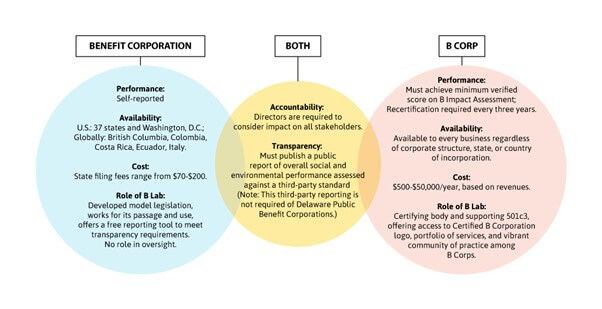Blog: All about…B Corps
- Business Advice
- Sustainability
- 5 Min Read
We’ve never been in a more socially and environmentally aware world. And that puts businesses under immense pressure. Pressure to do good, share success, deliver on promises, and to publically state their position on all sorts of things – from sustainability to community impact. And many already do.
Sustainability reporting isn’t new; Corporate Social Responsibility (CSR) or Environmental, Social and Governance (ESG) has been around for some time (and is now mandatory for some companies regulated by the Non-Financial Reporting Directive (NFRD)), but for those who really want to showcase their commitment to good, there’s B Corp certification.
If you’ve heard of B Corps but don’t know what they are, have a vague idea but want to know more, or are just looking for inspiration for future sustainability goals – keep reading.
What is a B Corp/what is a Certified B Corporation?
B Corps are those companies that place social and environmental impact as high on their priority list as financial profitability.
Those dedicated to meeting the highest standards of social and environmental performance possible can apply for certification from B Lab (a global non-profit focused on shifting the balance from capitalism, to a system that addresses society’s most critical challenges while benefiting everyone) who then track relevant ESG metrics and hold the certified accountable.
Certified B Corporations are businesses that meet the highest standards of verified social and environmental performance, public transparency, and legal accountability to balance profit and purpose. B Corps are accelerating a global culture shift to redefine success in business and build a more inclusive and sustainable economy. - B Lab
As of August 2022, there are 5,424 certified B Corporations across 156 industries in 84 countries.
How do you become B Corp certified?
Anyone across the world can apply for B Corp certification, but achieving it takes much more than just disclosing non-financial information and pledging to ‘do good’.
There is an extensive assessment stage, in which questions about everything from governances to workers, community, customers, suppliers, environment, and financials will be asked, evidenced, analysed, scrutinised
At the final stage of certification, B Corps are legally required to consider the impact of their decisions on all of their stakeholders by integrating stakeholder governance into the company’s governing documents.
Stakeholder governance looks to move prioritisation away from profits – which they would be under shareholder governance – to ensuring the interest of all stakeholders is what drives decision making. Stakeholders here means everyone and everything affected by company activities: customers, workers, suppliers, communities, investors, and the environment.
Put simply: stakeholder governance ensures we have better businesses that are accountable to people and planet. - B Lab
In jurisdictions where other corporate governance legal frameworks are in place, B Lab advocates for companies to adopt stakeholder governance commitments within company constitutions, articles of incorporation, and other formation documents, in order to embed the same structures that feature in benefit corporation laws.
Being a Certified B Corporation isn’t the same as being a benefit corporation
If you’ve heard the term ‘benefit corporation’, don’t get confused.
A benefit corporation is a type of corporate governance recognised in some states of the US.
It sprang out of the B Corp movement and their purposes overlap (consideration of impact beyond just shareholders but to wider stakeholders), but they’re not the same.
 Source: https://socapglobal.com/2021/04/whats-the-difference-between-a-b-corp-and-a-benefit-corporationSource:
Source: https://socapglobal.com/2021/04/whats-the-difference-between-a-b-corp-and-a-benefit-corporationSource:
Famous B Corps
Many household names hold B Corp certification.
There are over 700 in the UK across all sectors and sizes, including Riverford Organic Farmers, Divine Chocolate, Big Issue Group, EQ Investors Group Ltd, Danone, Gousto, Zen Internet, Guardia Media Group, Apro and Octopus Group.
Why think about becoming B Corp certified?
As leaders in the movement for economic system change, B Corps reap remarkable benefits.
They build trust with consumers, communities, and suppliers; attract and retain employees; and draw mission-aligned investors.
As they are required to undergo the verification process every three years – and they’re expected to increase their score in that time to prove they’re progressing towards becoming an ever more equitable, inclusive, and regenerative business – B Corps are by definition also focused on continuous improvement, leading to long-term resiliency.
Where to start?
If you need help with setting up effective record keeping in preparation for certification or to explore sustainability reporting further, get in touch with our business advice team who can help get you started.
Contact us
 Source: https://socapglobal.com/2021/04/whats-the-difference-between-a-b-corp-and-a-benefit-corporationSource:
Source: https://socapglobal.com/2021/04/whats-the-difference-between-a-b-corp-and-a-benefit-corporationSource: 
